
Donald Trump has been re-elected as the 47th President of the U.S., delivering a defeat to his Democratic rival, Kamala Harris. The second presidency of Donald Trump begins on Jan. 20, 2025. In his victory speech, triumphant Trump declared, “This will truly be the golden age of America. This is a magnificent victory for the American people that will allow us to make America great again.”
Weeks before the 2024 U.S. presidential election, the media was filled with reports predicting a close race between Donald Trump and Kamala Harris. As Harris continued to bring a fresh wave of energy with her campaign slogan, “New Way Forward,” even the Economist’s presidential election forecast model predicted Harris’s victory. However, Donald Trump emerged as the dominant victor when the votes were counted. He won all seven swing states and became the first Republican since the 2004 election to surpass the Democratic candidate in the total popular vote.
The United States Congress operates as a bicameral institution, consisting of two chambers: the Senate and the House of Representatives. The Senate is composed of 100 members. Each state elects two senators, irrespective of its population, serving six-year terms.
Meanwhile, the House of Representatives has 435 members, with seats distributed based on state populations, serving two-year terms. This structure balances the interests between the interests of smaller states through equal Senate representation and larger states through proportional representation in the House.
The Senate is called the upper chamber. It has the sole power to confirm ratifying treaties and confirm presidential appointments. As the lower chamber, the House initiates revenue bills and has the exclusive power to impeach federal officials. To send a bill to the President for signing, both the House and the Senate must pass the same bill by a majority vote. If the President rejects the bill, the House and Senate can override the rejection by passing the bill again with at least a two-thirds majority in each chamber.
Republicans gained the majority in the 2024 battle for the Senate race. Among 100 seats, 34 were the subject of election. As a result, the Republicans took over 52 while 51 seats were needed for control. In the battle for the House of Representatives, all 435 seats were contested. 218 seats are required for control, and Republicans took over 219 seats, accomplishing the Red Sweep. Now that the President’s party also controls the House of Representatives and the Senate, Donald Trump’s Republican Party has increased its chances of fulfilling key promises through the governing trifecta. Through this power advantage, Trump may push through his big promises regarding migrants, tariffs, and the rolling back of environmental regulations.

Trump promised the largest deportation of undocumented immigrants in American history. He also pledged to complete the construction of the wall along the border with Mexico. In 2023, the Biden-Harris administration saw the highest number of crossings at the U.S. southern border. Deporting all these individuals would require Trump to deal with significant legal and logistical challenges.
Donald Trump proposed to strengthen a merit-based immigration plan to prioritize skilled workers and reduce reliance on family-based immigration and random lotteries. This aims to increase merit-based green cards. Trump described it as pro-American, pro-immigrant, and pro-worker. However, as during Trump’s previous administration, the path for graduate students seeking to study in the United States is likely to become more restricted.
Under the Biden administration, the CHIPS Act provided subsidies and various incentives for building semiconductor plants within the United States. However, Trump criticized the policy, and experts suggested it might be subject to revisions. Trump thought outside the box, stating that imposing higher tariffs would naturally compel foreign companies to establish manufacturing facilities within the U.S.
In addition to semiconductors, electric vehicle subsidies are another critical issue for South Korea. Trump has announced plans to scale back existing EV subsidies. Trump has stated, “The biggest threat is not global warming, where the ocean’s going to rise one-eighth of an inch over the next 400 years … and you will have more oceanfront property, right?” in an Aug. 12 interview on X with Elon Musk. Trump’s actions are expected to hurt South Korea’s automotive and battery companies.
Whether the House and Senate will align with Trump’s proposals remains uncertain. Unlike Democrats, Republicans tend to have less unified positions, and individual congress members in both chambers may take actions opposing Trump to prioritize the interests of their respective states.


